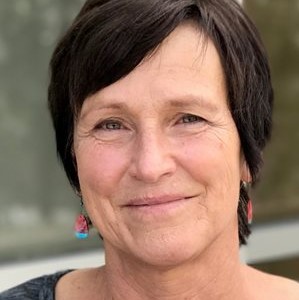Margaret H. Redsteer
Associate Professor

Ph.D. Trace Element Geochemistry/Geosciences, Oregon State University
M.S. Sedimentary Processes/Earth Sciences, Montana State University
B.S. Geology, Northern Arizona University
Office: UW1-248
Email: mredst@uw.edu
Teaching
My teaching experience has involved mostly non-traditional service-learning settings. This experience has taught me the value of teaching concepts through real-life experiences to address community issues. University courses should allow students to become part of a classroom community that is engaged in critical thinking and provide opportunities for practical experience, to prepare for life beyond the classroom and assign meaning to academic goals. In order to accomplish these goals, I hope to create a classroom environment that will expand perspectives and facilitate inclusivity while participants gain an appreciation for the contributions of others, and the relevance of science in everyday life. I aspire to have a classroom where everyone is eager to work together in a welcoming environment, because understanding differing perspectives and expanding one’s own point of view is often how wisdom is gained, and is required for a complete understanding of a subject. Practical experience involves coursework centered around collecting and evaluating information from relevant place-based examples, so that each student gains experience in analyzing real data, to understand how data translates into information that can address critical societal issues. Learning to communicate concepts and to explain relevant information is also a crucial part of the learning process. Communicating to others what could be critical information for their community and personal well-being is an important life-skill. Therefore, I also want students to become comfortable and practiced in discussing data and hypotheses, and explaining to others how and why information is relevant.
Courses
BIS 243 Introduction to Environmental Issues
BES 341 Natural Hazards and Human Disasters
BIS 346 Climate Change Adaptation Policy
Research/Scholarship
I examine aspects of global change that include interactions of different landscape processes including erosion by wind and water, and how changing vegetation communities and climate can influence these processes and exacerbate geologic hazards. In the southwest, I have examined aspects of drought and increasing aridity that have not been well quantified, including seasonal changes to surficial processes and ecologic conditions. This work requires detailed geomorphologic mapping, sediment sampling, seasonal vegetation surveys, and meteorological monitoring, but also requires investigations of land use history and policy. Incorporating Indigenous knowledge from tribal elders about the changes they have observed has aided my research in elucidating the effects of increasing temperatures in poorly monitored regions of the U.S. and communicates the relevance of ecosystem change to the livelihoods of those who are most vulnerable. Increasing aridity and it’s alteration of ecosystem services has serious consequences for marginalized populations, agriculture, grazing, and infrastructure.
Selected Publications
- Redsteer, M.H. (In Press) Knowing the Land; in David Wilkins (ed.) A 21st Century Reflection on the Words of Vine Deloria, Jr., University of Nebraska Press.
- Redsteer, M.H., Krupnik, I., and Maldonado, J.K., 2022. Native American Communities and Climate Change; in Krupnik (ed.) Handbook of the American Indian, Vol. 1, Smithsonian Institution, pp. 247-264.
- Redsteer, M. H. 2020, Sand dunes, Modern and Ancient, on Southern Colorado Plateau Tribal Lands, Southwestern USA: Chapter 8 In Inland Dunes of North America, N. Lancaster and P. Hesp, eds. Springer Press, pp. 287-310.
- Redsteer, M.H., Kelley, K.B., Francis, H. and Block, D. 2018. Increasing Vulnerability of the Navajo People to Drought and Climate Change in the southwestern United States: Accounts from Tribal Elders; in Indigenous Knowledge for Climate Change Assessment and Adaptation, Douglas Nakashima, Jennifer Rubis and Igor Krupnik, eds., Cambridge University Press, Cambridge, United Kingdom and New York, NY, USA, pp. 171-187.
- Thomas, K. and Redsteer, M.H. 2016. Vegetation of semi-stable rangeland dunes of the Navajo Nation, southwestern USA; Arid Land Research and Management, Vol 00 p. 1-12.
- Bogle, R., Redsteer, M.H. And Vogel, J. 2015. Field measurements and analysis of climatic factors affecting dune mobility in the Grand Falls area of the Navajo Nation of the Colorado Plateau, southwestern United States; Journal of Geomorphology, vol. 228, p. 41-51.
- Redsteer, MH., Bemis, K., Chief, KD., Gautam, M., Middleton, B.R., and Tsosie, R., 2013. Unique Challenges Facing Southwestern Tribes: Impacts, Adaptation and Mitigation; in Assessment of Climate Change in the Southwest United States: A Technical Report Prepared for the U.S. National Climate Assessment, Greg Garfin, Angie Jardine, and Jonathan Overpeck, eds., Island Press, p 385-404.
- Doyle, J.T., Redsteer, M.H., and Eggers, M.J. 2013. Exploring effects of climate change on Northern Plains American Indian Health; Journal of Climatic Change Special issue on “Climate Change and Indigenous peoples in the United States: Impacts Experiences, and Actions” Maldonado, J.K., Pandya, R.E. and Benedict, J.C. eds. Vol 120 (3) p. 643-655.
- Draut, A.E., Redsteer, M.H. and Amoroso, L., 2012. Recent seasonal variations in arid landscape cover and aeolian sand mobility, Navajo Nation, southwestern U.S.; Climates, Landscapes, and Civilizations Geophysical Union Monograph Series 198, p 51-60.
- Redsteer, M. Hiza, Kelley, K.B., Francis, H. and Block, D., 2010, Disaster risk assessment case study: Recent drought on the Navajo Nation, southwestern United States; in Annexes and Papers for the 2011 Global Assessment Report on Disaster Risk Reduction, United Nations 19p.
